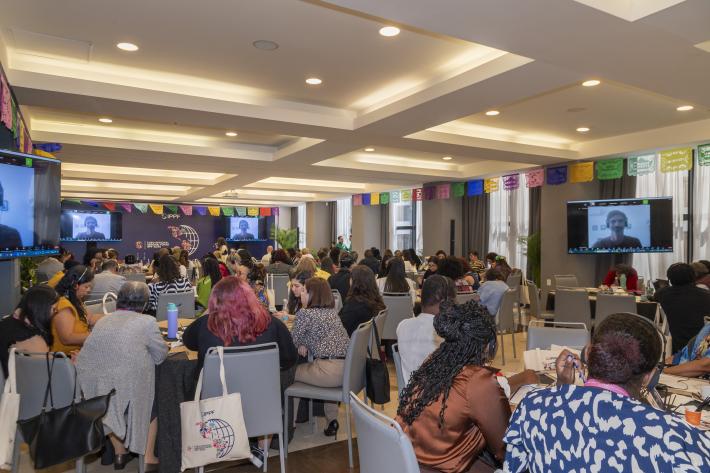Latest press releases
A selection of stories from across the Federation
Americas & the Caribbean
Breaking: IPPF Global Research Exposes Devastating Impact of the Trump Administration
Over Half of Partners and $85 Million Affected
For media enquiries


| 29 August 2024
IPPF ACRO on the serious rollback of abortion in Aguascalientes
Today, the Congress of Aguascalientes, a state in Mexico, has taken a serious step backward for sexual and reproductive rights by reducing the legal limit for abortion from 12 to 6 weeks of gestation. This decision directly violates the rights of women and people who seek abortions and contradicts the ruling of the Mexican Supreme Court of Justice, which mandates the repeal of laws criminalizing voluntary abortion in the State Penal Codes. We reaffirm IPPF ACRO's commitment to the sexual and reproductive rights of all people and will continue to advocate for the freedom to choose an abortion without time restrictions. With deep solidarity, we embrace the local organizations, collectives, and activists who have fought to guarantee access to safe abortion in Aguascalientes and across the country. We join their efforts: we will not allow a regression in rights that have already been recognized, and we will move forward together to ensure that cis women, trans men, non-binary people, and other dissidents are included in abortion legislation. Together, we will continue to build networks of rights, care, and resistance!

| 24 July 2024
IPPF ACRO and FPA celebrate historic decision for LGBTQI+ people in Aruba and Curaçao!
Haz click aquí para leer esta historia en español. On July 12th, the Dutch Supreme Court validated same sex marriage in Aruba, Curaçao, and St. Maarten, emphasizing that prohibiting same-sex marriage violates the constitutional ban on discrimination. The court’s decision upholds a ruling from September 2021, which had been challenged by both countries. IPPF ACRO and FPA urge the governments of Aruba and Curaçao to promptly comply with the Supreme Court's decision as it is a matter of fundamental rights. Ensuring adherence to this ruling is essential for the protection and equality of the LGBTQI+ community. Coming after Aruba’s parliament rejected the marriage equality bill almost a month ago, this ruling continues a trend in the region to legalize and protect LGBTQI+ populations. FPA and Famia Plania, IPPF Members in Aruba and Curaçao, has for decades advocated and supported efforts towards LGBTQI+ equality, with quality sexual and reproductive health services provision as well as community articulation. “This positive outcome is a major step towards visibility, rights and access to health, such as sexual and reproductive services for all LGBTQI+ people in the Dutch Caribbean. At FPA, we are deeply committed towards inclusion, and as we celebrate this ruling, we will continue using our voices to advocate for social change,” states Evelyn Yarzagaray, Executive Director of FPA, IPPF Member Association in Aruba.

| 16 October 2023
IPPF ACRO express concern over guidance of the Zambian Ministry of Health who advised against the use of the term “sexual and reproductive health and rights”.
At a time of profound and multiple crises, it is worrying that the focus of any government's action is to go back on already consolidated international commitments, particularly those which recognize, based on evidence, that Sexual and reproductive health and rights (SRHR) are fundamental human rights, central to eradicating poverty and achieving sustainable development across its social, economic, and environmental dimensions. SRHR – which encompasses a range of issues, including universal access to SRH services and supplies, comprehensive sexuality education, and ending gender-based violence and harmful practices such as early, child and forced marriage – are fundamental to the ability of all people, especially women, adolescent girls and young people, to lead full, satisfying, healthy and productive lives. SRH services are a critical aspect of SRHR, but a complete understanding of sexual and reproductive health and rights goes far beyond on access to health facilities and services to include an array of social, legal, institutional, and financial arrangements that enable individuals to exercise their rights in general and addresses the underlying social determinants. In this regard, our Latin American community urges the government of Zambia to review its position and, on the contrary, to improve and expand the SRHR services, including increasing funding in this sector, for example by investing in fulfilling the human rights of women and girls, in all their diversity, as gender discrimination is one of the leading determinants of poor health and unwanted SRHR outcomes. It is also key to addressing inequities in access due to poverty and multiple forms of discrimination, stigma and social and economic exclusion affecting various population groups. We conclude by highlighting the importance of evidence-based policies and, in 2023, the data indicates that effective policies are not those based on stigma and discrimination or elimination of rights. On the contrary, effective policies are those that include, care for, and treat all people as subjects of rights, capable of making decisions about their health and reproductive life, with the support of a State committed to promoting citizenship and the human dignity of their people. Here, at IPPF ACRO, we will remain attentive and always willing to contribute so that rights do not go backwards and no one is left behind. In solidarity, Eugenia Lopez Uribe Regional Director for the Americas and the Caribbean
















